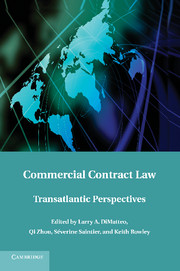Book contents
- Commercial Contract Law
- Commercial Contract Law
- Copyright page
- Dedication
- Brief Contents
- Contents
- Contributors
- Foreword
- Part I The Role of Consent
- Part II Normative Views of Contract
- Part III Contract Design and Good Faith
- Part IV Implied Terms and Interpretation
- Part V Policing Contracting Behavior
- Part VI Misrepresentation, Breach, and Remedies
- 16 Remedies for Misrepresentation
- 17 Re-Examining Damages for Fraudulent Misrepresentation
- 18 Remedies for a Documentary Breach
- 19 The Irrelevance of the Performance Interest
- Part VII Harmonizing Contract Law
- Index
18 - Remedies for a Documentary Breach
English Law and the CISG
from Part VI - Misrepresentation, Breach, and Remedies
Published online by Cambridge University Press: 05 February 2013
- Commercial Contract Law
- Commercial Contract Law
- Copyright page
- Dedication
- Brief Contents
- Contents
- Contributors
- Foreword
- Part I The Role of Consent
- Part II Normative Views of Contract
- Part III Contract Design and Good Faith
- Part IV Implied Terms and Interpretation
- Part V Policing Contracting Behavior
- Part VI Misrepresentation, Breach, and Remedies
- 16 Remedies for Misrepresentation
- 17 Re-Examining Damages for Fraudulent Misrepresentation
- 18 Remedies for a Documentary Breach
- 19 The Irrelevance of the Performance Interest
- Part VII Harmonizing Contract Law
- Index
Summary
While the UN Sales Convention (CISG) has gained importance, English law continues to play a leading role in the international commodities trading. There is a view that the CISG is not particularly well suited to highly volatile markets, such as commodities, where prices fluctuate heavily and traders are primarily concerned with speculation, rather than the use of the goods. Because of high price fluctuations, strings structures of many of the transactions, standardisation of goods and contracts, and the special significance of documents (with much of the trade being conducted by means of the transfer of documents which provide the buyers and/or banks with security), the legal regime appropriate for, and facilitative of, such a trading environment should be one which, among other things, is certain and predictable and contains a robust set of rules and principles governing documentary performance and consequences of documentary breaches. The CISG, on this view, is not an entirely satisfactory law since some of its crucial provisions are too open-ended, causing much uncertainty, while others, such as those allowing cure and the fixation of an additional time for performance, are inimical to the need for speedy decision making in volatile markets. As to documents, the CISG is, in the words of a proponent of this view, ‘a blank page’. English law, in contrast, has a long history of governing commodities and documentary trade and is therefore much better suited to dealing with those trade sectors. In retort it can be argued that the CISG is no less capable of governing contracts in these trade sectors; its open-ended provisions together with its contextual rules of interpretation are, in fact, its strength because they enable the CISG to be adapted to the particular needs of businesses in a given trade sector.
This chapter seeks to engage with and to contribute to this discussion by focussing on remedies for documentary breaches under English law and the CISG, with the focus being placed on the remedies of termination, rejection, and damages. This chapter will identify some of the problems in English law, engage with the debates surrounding them and evaluate the claim that English law is better suited than the CISG to governing documentary trade. As far as the CISG, the chapter will examine, in a detailed and focussed manner, the ways in which its remedies have been applied in connection with documentary breaches. The application of the CISG remedy provisions is then compared with that of English law. The chapter concludes with suggestions as to which of the laws are best suited for the needs of documentary and commodities trading.
- Type
- Chapter
- Information
- Commercial Contract LawTransatlantic Perspectives, pp. 434 - 465Publisher: Cambridge University PressPrint publication year: 2013



